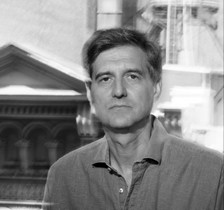
Milos Raickovich (b. 1956, Serbia), a composer and conductor, has lived in Belgrade, Paris, Los Angeles, Honolulu, Hiroshima and New York, where he now resides. While in Belgrade, Milos Raickovich was the founder of the Ensemble for Different New Music (1977), as well as one of the founders of the Borislav Pascan Youth Philharmonic. Raickovich’s music has been performed in Europe, the USA and Japan.
Milos Raickovich studied composition with Vasilije Mokranjac, Olivier Messiaen and David Del Tredici; and conducting with Borislav Pascan, Pierre Dervaux, and Herbert Blomstedt. He holds a Ph.D. in composition from The City University of New York, and has taught at several universities in the U.S. and Japan.
Raickovich’s music is released on CDs: New Classicism (Mode Records), featuring the Moscow Symphony Orchestra conducted by the composer; B-A-G-D-A-D and Far Away (Albany Records). The Los Angeles Times critic Mark Swed describes Raickovich’s music as “a unique postmodern response to both minimalism and multiculturalism.”
About the piece
Lovely Permutations, for two pianos, or piano 4-hands, was written for LP Duo (Sonja Lončar and Andrija Pavlović) in 2021. The LP Duo premiered the piece in their concert dedicated to minimalism in Kassel, Germany, in April of 2022. This piece was inspired by my early works – a composition cycle Permutations (1977-79), written for multiple keyboards. In Lovely Permutations, I used various musical structures from the cycle Permutations. While my early cycle is based on permutations of six tones, in Lovely Permutations I have further reduced the scale to five tones. At times, permutating process is following gradual mathematical procedures, but sometimes, random permutations are used. After completing Lovely Permutations for two pianists, I made a version of the same piece for an ensemble of 10 players, dedicated to a Kassel based ensemble, in process.
I like to call my early style „Ascetic Minimalism.“ These early works enabled me to later develop my current „style,“ which I call New Classicism. The main motivation for writing Lovely Permutations was a desire to hear (and preserve) the music of permutations in a new instrumentation, and to combine various structures of several early works into a collage-like, single-movement piece.


